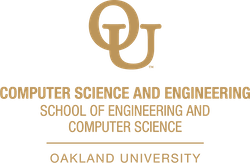MS in Artificial Intelligence
Market research has demonstrated that there are few fields with as much projected growth over the next 10 years as artificial intelligence. With increased globalization of artificial intelligence and worldwide collaboration efforts for technology development, it is expected that students graduating with this degree will have a good opportunity for finding high-level research engineering positions in different industries in Michigan, across the United States, as well as anywhere else in the world. The program will also allow students to build their technical skills and to further understand the complex human systems in which they will be implemented.
The program requires 16 semester hours of foundation and core courses and 16 semester hours of depth/elective course work for a total of 32 semester hours. Professional track students are required to take at least 3 depth courses. Research track students are required to take Master’s Thesis Research plus at least 2 depth courses.
Option 1: Professional Track. This option requires students take only courses, which may include an independent study, based on the preferences of the student. The minimum requirements are as follows:
Core courses – 12 credit hours
Depth/concentration courses – 12 credit hours
Elective courses – 8 credit hours
Option 2: Research Track. This option requires a research thesis or project prepared under the supervision of the advisor. The thesis or project describes a research investigation and its results. The scope of the research topic for the thesis should be defined in such a way that a full-time student could complete the requirements for a master’s degree in 24 months or 6 semesters following the completion of course work by regularly scheduling graduate research credits. The minimum requirements are as follows:
Core courses – 12 credit hours
Depth/concentration courses – 12 credit hours
Master’s Thesis/Project and/or Research/seminar Courses — 8 credit hours
Core Courses
All students, regardless of whether they are on the professional or research track, must take 12 credits of core courses, including:
• CSI 5130 – Artificial Intelligence (4 credits)
• CSI 5170 – Machine Learning (4 credits)
• CSI 5390 – Software Engineering OR CSI 5220 – Object Oriented Analysis Design (4 credits)
Depth Courses
Students must declare one concentration from which to take 12 credits of depth courses. Each concentration has one required core course, and two elective courses.

Full catalog information will be available in summer ’23.
Questions? Contact us!
Dr. Hua Ming
Academic Programs Coordinator
Email: ming@oakland.edu
Preparation for the MS in AI
Regular admission to the program requires a bachelor’s degree in a science, technology, engineering, or mathematics (STEM) field earned with an average
of B (or better) from an accredited program. Students without prior technical knowledge may be required to complete a PACE noncredit certificate, or a foundational Graduate Certificate in Computer Science, to be eligible for admission in the MS in AI program. An entering student should have completed one course in probability and statistics, one course in programming, and one course in calculus II (see the table shown below). A course in calculus III and a course in linear algebra are recommended but not required.
Deficiencies in the prerequisites may be made up after entrance into the program. Students with such deficiencies must complete the missing prerequisite course(s) with a grade of “B” or better within the first two semesters after entering the program. Students without a computing background should first complete our foundational Graduate Certificate in Computer Science, which upon successful completion, can be combined with other certificates and applied toward a full AI master’s program. The foundational Graduate Certificate in Computer Science is composed of CSI 5390 – Software Engineering OR CSI 5220 – Object Oriented Analysis Design, CSE 5610 – Advanced Data Structures and Algorithms and CSI 5500 – Operating Systems I. Industry experience in programming and computing can be considered as part of the evaluation process and an interview can be conducted with the applicant to check their credentials.

